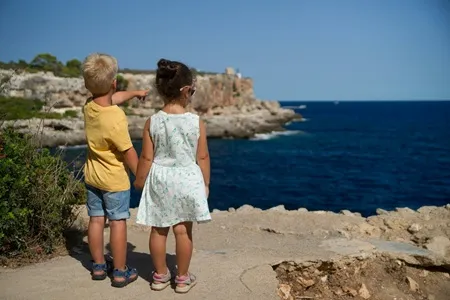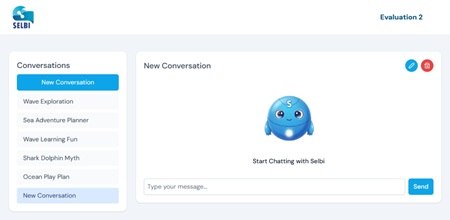-
 Welcome to plumtriA platform for Research & Innovation
Welcome to plumtriA platform for Research & Innovation -
 Register today to start receiving our monthly newsletter
Register today to start receiving our monthly newsletter -
 Looking for Funding?Check out the current open calls
Looking for Funding?Check out the current open calls -
 Looking to partner up?Search our list of registered profiles
Looking to partner up?Search our list of registered profiles -
 You have questions on a particular funding programme?
You have questions on a particular funding programme?
Project SELBI: Supporting Early Childhood Education in Blue Skills with Generative Artificial Intelligence
Image

What if our youngest learners grew up with a holistic understanding of the sea and its environment? Supporting Early chiLdhood education in Blue skills with generative artificial Intelligence (SELBI) is a nationally-funded research project at the Malta College of Arts, Science and Technology (MCAST) designed to help make that possible. Its ambitious purpose is to equip Early Childhood Education and Care (ECEC) educators with the knowledge, tools and professional confidence to teach young children about the marine environment, sustainable living and the ethical use of natural resources, supported by trustworthy artificial intelligence. This work is aligned with Malta’s Vision 2050 and with the National Strategy for Sustainable Development, which both place long-term environmental responsibility and sustainable economic transition at the centre of national policy.
SELBI responds to a strategic national concern. Malta’s economy is deeply tied to the sea, through sectors such as fisheries, coastal tourism, marine transport and maritime services. However, growing environmental pressure along Malta’s coastline and the documented shortage of workers able to operate sustainably within the blue economy expose a long-term vulnerability. The project proceeds from a clear position: by the time young people are making post-compulsory career choices, intervention is already too late. A culture of ecological responsibility, and an understanding that the sea is both valuable and fragile must be formed in early childhood.
The project draws together expertise in ECEC, marine sustainability, artificial intelligence and educational research. Over the past 12 months, the team has advanced through a set of coordinated phases to build, test and refine the SELBI approach.
First, the team conducted a nationwide, statistically robust survey with educators working in Kindergarten 1, Kindergarten 2, Year 1 and Year 2 across Malta. Educators were asked about their confidence in addressing areas such as marine habitats, coastal care, responsible resource use and water conservation. Its purpose was diagnostic: to identify knowledge gaps and the practical difficulties these educators encounter when supporting children’s learning about these ideas in everyday practice.
Second, the SELBI team developed a dedicated knowledge base in response to the needs identified. This repository consists of pedagogically-appropriate material designed specifically for children in the ECEC sector in Malta. It includes prompts for guided discussion, hands-on exploratory experiences, narratives and explanatory texts that introduce ideas of care, interdependence and stewardship of the sea. The material is co-designed by ECEC specialists together with a blue economy expert, ensuring alignment with established principles of early childhood learning, namely inquiry and play.
In parallel, the AI specialists on the team designed and built an artificial intelligence platform intended to support educators directly. The platform uses a retrieval-augmented generation (RAG) system that can respond to educators’ questions in real time with information that is scientifically accurate, pedagogically appropriate for ECEC learners and sensitive to the Maltese context. Unlike general-purpose AI tools, this RAG system is built on a curated knowledge base developed by the SELBI team, meaning its responses are grounded in vetted, ECEC-appropriate material rather than generic or speculative output. At this stage, SELBI has reached Technology Readiness Level 4 (TRL4). The core system has been architected and prototyped and is now entering controlled testing in realistic but supervised conditions. The SELBI team has already completed approximately 30 test runs to assess pedagogical suitability, factual accuracy, child safety, inclusivity and resilience against AI hallucination.

The next phase is live educator testing. Following the necessary approvals, a participating school has been identified, and one educator from each of the ECEC year levels has agreed to collaborate with the research team. Over four months, these educators will work with the SELBI platform, provide structured feedback, and directly inform its refinement.
As the project moves forward, SELBI aims to strengthen early childhood pedagogy in Malta and to offer a scalable model for how artificial intelligence can support marine education in the early years.
The project team consists of six researchers at MCAST: Dr Shirley Ann Gauci (Principal Investigator), Dr Francis Delicata, Mr Alan Gatt, Mr Frankie Inguanez, Dr Heathcliff Schembri and Ms Kimberly Terribile.
SELBI is funded by Xjenza Malta under the Research Excellence Programme (Grant Agreement REP-2024-005).
To learn more about the project and follow its progress on SELBI website, Facebook page, and LinkedIn page.
Information and image source:

plumtri is a platform that facilitates networking and knowledge sharing amongst stakeholders in the Mediterranean, involved in the spheres of research and innovation and serves as a 'one-stop-shop' for information on relevant funding opportunities and events.
Contact Us
Address:
Xjenza Malta
Villa Bighi,
Dawret Fra Giovanni Bichi,
Kalkara KKR 1320,
Malta.
(+356) 2360 2161



